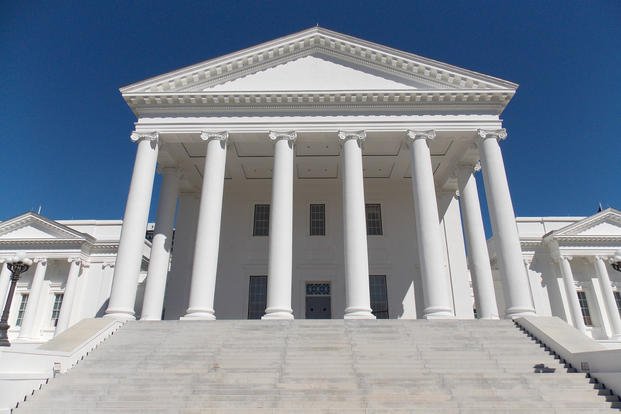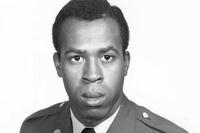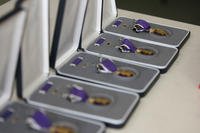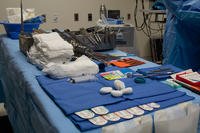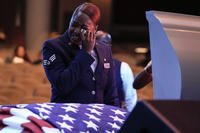When this year's high school seniors started applying for scholarships, Stuart McFaden told his son, Riley, he didn't have to worry about finances.
"I paid your bill with my body, my sacrifice, my mind," said McFaden, a Spotsylvania County, Virginia, veteran who served 20 years in the Marine Corps. "I told him to save those scholarships for other kids who could use the leg up."
McFaden is "T&P," or totally and permanently disabled as a result of three combat deployments in Iraq and Afghanistan. The chief warrant officer-3 suffered a traumatic brain injury in a rocket attack and was left with chronic back pain and shoulder injuries. He has post traumatic stress syndrome so acute, he can't sleep in the same bed as his wife, Anastasia, due to violent nightmares.
The McFadens hoped the hardships he suffered would at least entitle their five children, including Riley, who's set to graduate in a few days, to a college education. They planned to use the Virginia Military Survivors and Dependents Education Program, or VMSDEP, to cover tuition as well as room and board, books and supplies.
The program is for spouses and children of military members killed, missing in action, taken prisoner or rated at least 90% disabled as a result of military service in an armed conflict.
McFaden and other veterans statewide recently discovered language in the state budget bill that would lessen VMSDEP's benefits. Instead of covering the full costs, the program would become a last payer, used only after students have exhausted other local, state and federal funding.
If a family planned to contribute a certain amount, that EFC, or "expected family contribution," would have to be paid first. Only the first bachelor's degree would be covered, and no graduate degrees.
More Are Using the Benefits
The State Council of Higher Education has recommended the changes because Virginia colleges have been absorbing the lost revenue or spreading the cost of the waiver to other students, according to a story in the military newspaper Stars and Stripes.
Estimated costs of the tuition waivers have nearly quadrupled, from $12 million in 2019 to $46.3 million in 2022, according to the council. The cost could climb as high as $190 million by 2026.
"How long this rate of growth can be sustained is unknown," stated the council in its budget recommendations.
The University of Mary Washington in Fredericksburg has 156 students using the VMSDEP benefits, which are administered through the Virginia Department of Veterans Services.
Virginia Commonwealth University has the highest number of students in the program. Almost 1,200 students, or 25% of the state’s total VMSDEP recipients, are enrolled at the Richmond university, according to a story on the VCU News website.
In January, VCU requested state financial support to help pay for the waivers. The program has been "a difference-maker for our VCU military-affiliated community," said Stephen Ross, director of Military Student Services at VCU.
Results of 2 Wars
Increased participation in the state program is "an unfortunate result of what happened post-9/11," said Stafford County resident Caitlin Goodale -- Porter.
"Two wars will tend to make more veterans be rated high enough to make their family members eligible for this," she said.
Goodale -- Porter spoke before the Stafford Board of Supervisors and described a "ragtag group of veterans" who've been working with Gov. Glenn Youngkin and state legislators to maintain the program. They're particularly upset that the program wasn't even named and therefore, wasn't noticed by legislators.
"I had no idea they snuck it into the budget," Sen. Bryce Reeves of Spotsylvania wrote in an email.
The group, known as Friends of the VMSDEP, started a petition that netted 4,000 signatures in early April -- which happens to be the month of the military child -- and met with legislators on April 17, which was supposed to have been the day the General Assembly voted on the budget.
Language in the budget bill ended up getting changed.
On Thursday, House Appropriations Chairman Luke Torian, D-Prince William, confirmed that General Assembly budget negotiators had reached a compromise with Gov. Glenn Youngkin that they hope to approve Monday.
Details of the compromise will not be available until Saturday.
"We need to make sure this benefit stays viable, is well-funded and available for the families, especially of those who died in uniform, who've made entire educational plans dependent upon this," Goodale -- Porter said.
'Fight for This'
The Friends group has gotten support from several legislators across Virginia and local representatives including Reeves, Sen. Jennifer Carroll Foy, and Dels. Josh Cole, Mark Sickles and Laura Jane Cohen.
Veterans have rallied as well.
"It's been very inspiring to see so many veterans come together and really just buckle down and say we believe this is right and we need to fight for this," said Kayla Owen of Stafford, who helped form the Friends group.
Her husband, Dan, also is 100% disabled as a result of counterterrorism missions while in the Coast Guard. As a result of medical experiences they went through, Kayla Owen wants to become a nurse practitioner, and the couple planned to wait until their youngest child, now 4, was in prekindergarten so she'd have the time to study. They also hoped their two children would get a college education through the program.
If she's no longer eligible for benefits, she won't be able to pursue a degree.
"We don't have the financial means to make that happen," she said.
A Win-Win?
As much of a hardship as the program change could pose to Kayla Owen and Goodale -- Porter, both said they're advocating for veterans who were killed in service. One is Army Lt. Col. Joseph Fenty Jr., killed in a helicopter crash in Afghanistan in 2006.
His daughter, Lauren, was 28 days old when he died. She never met her father, said her mother, Kristen Fenty of Virginia Beach.
"There were so many challenges to overcome during those early days," the mom wrote in an email. "Learning Lauren was eligible for VMSDEP let me breathe a sigh of relief."
Lauren found out about the possible change in VMSDEP on her 18th birthday as she plans to attend the University of Virginia in the fall and eventually earn a medical degree. "VMSDEP is central to that plan," her mother said.
Goodale -- Porter says she believes the state talks a good game about "purple schools" that are friendly to the needs of military children and "hidden heroes," kids who are caretakers for their veteran parents.
"But it seems that saving money is the bottom line, not honoring our commitments, even to Gold Star families," she said. "That's where I've gotten angry. Luckily, that anger, fury really, has made us pretty effective, and I do think there's a strong chance we'll come out of this with a win -- win eventually."
(c) 2024 The Free Lance-Star (Fredericksburg, Va.)
Visit The Free Lance-Star (Fredericksburg, Va.) at www.fredericksburg.com/flshome
Distributed by Tribune Content Agency, LLC.
